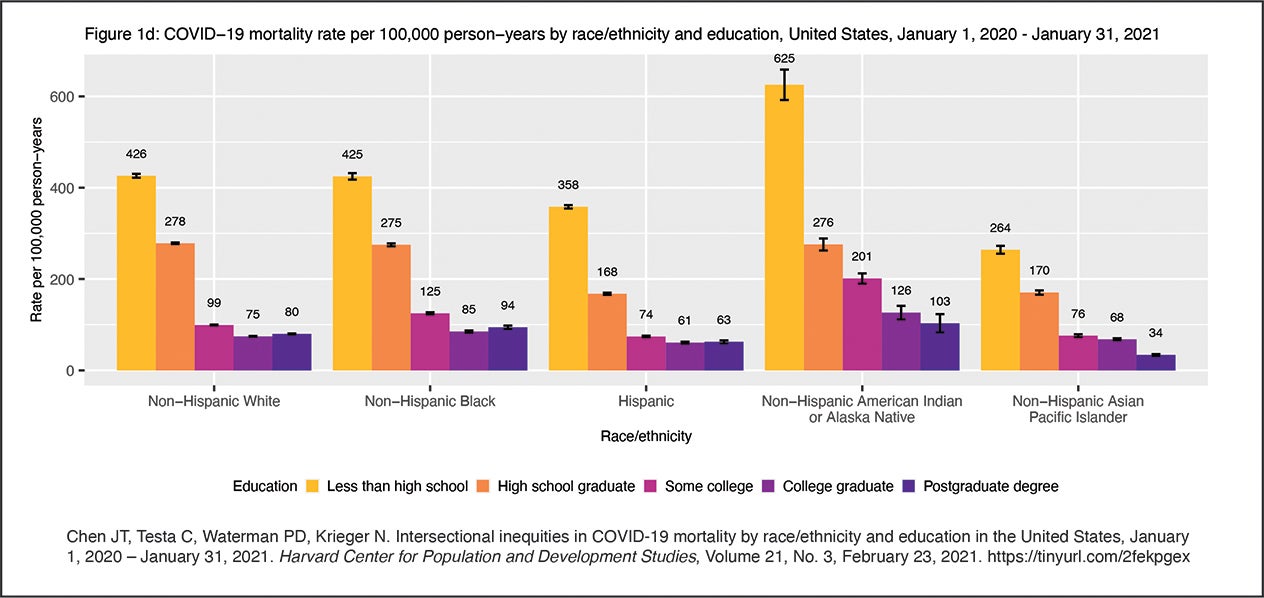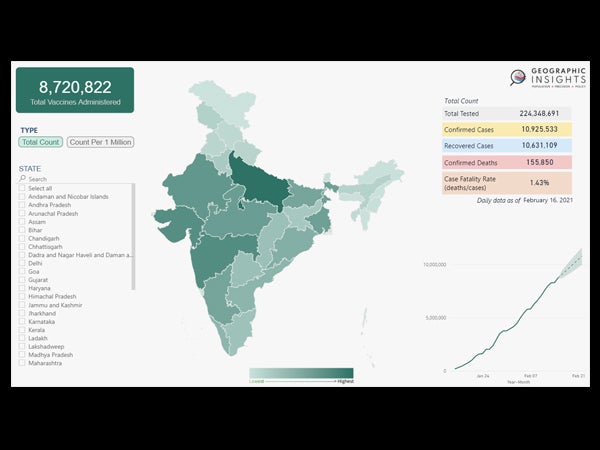An op-ed on health policy published in JAMA explains why the healthcare sector can only skim the surface when it comes to addressing the deep structural drivers in declining life expectancy. The authors —Atheendar S. Venkataramani, MD, PhD, former Harvard RWJF Health & Society Scholar Rourke O’Brien, PhD, and Harvard Pop Center faculty member Alexander C. Tsai, MD, PhD —make a strong case for why the U.S. needs to enact bold…
Finally, a look at COVID-19 mortality rates by race/ethnicity AND EDUCATIONAL LEVEL
“Intersectional inequities in COVID-19 mortality by race/ethnicity and education in the United States, January 1, 2020–January 31, 2021,” is the latest Harvard Pop Center working paper by Jarvis Chen, Christian Testa, Pamela Waterman, and Nancy Krieger. On February 2, the US National Center for Health Statistics published data relating to COVID-19 deaths that had been missing from the government health statistics for the first year of the pandemic under the…
Geographic Insights Lab presents LIVE COVID-19 vaccine rollout dashboard for India by state
The Geographic Insights Lab is an initiative committed to improving public policies by honing in on targeted geopolitical units (such as congressional districts in the U.S. and parliamentary constituencies in India) in order to mine more precise population health and development data. This Lab, led by S V Subramanian, professor of population health and geography at Harvard T.H. Chan School of Public Health, has launched a new project that provides…
Analyzing electronic health records can be a fast and accurate way to predict risk of death from COVID-19
Hossein Estiri, PhD, is lead author on a study that utilized artificial intelligence to leverage the data compiled in electronic health records to compute individual-level risk scores for death after a COVID-19 infection. Among those predictors at the top of the list for those between the ages of 45-65 were age, history of pneumonia, diabetes (with complications), and cancer (breast and prostate). Learn more about the findings of this study…
It’s “Groundhog Day,” AGAIN! Nearly one-half of COVID-19 vaccination data is missing race/ethnicity info., reminiscent of earlier gaps in COVID-19 case and mortality data
A Harvard Pop Center working paper points out that the Morbidity and Mortality report by the US Centers for Disease Control released on February 2 (which happened to be Groundhog Day) is missing race and ethnicity information for nearly half of the people who were vaccinated during the first month of the roll out. Age and gender information were missing from only .1% and 3% respectively. The paper calls for…
Taking a closer look at the psychosocial stressors that are thought to affect health and mortality
A study focused on middle-aged and older Americans by Harvard Pop Center postdoctoral fellow Justin Rodgers, faculty members David R. Williams, Ichiro Kawachi, and S V Subramanian, along with their colleague Adolfo G. Cuevas, sheds light on the eight behavioral, biological, and psychological pathways commonly thought to play a role in the association between stress and health.
Study aims to advance prevention of HIV/AIDS among young women in low- and middle-income countries
Two researchers affiliated with the Harvard Pop Center (Chungling Lu, PhD, and S V Subramanian, PhD) and their colleagues assessed levels of knowledge of HIV/AIDS and associated socioeconomic disparities among young women between the ages of 15-24 using Demographic Health Surveys from 51 low- and middle-income countries completed between 2002–2018. Their findings, published in JAMA Network Open, point to there being a need to increase knowledge of HIV/AIDS across this…
When discharging older adults from the hospital, considering mental health could help to reduce hospital readmissions
A study by Harvard Sloan Fellow on Aging and Work Leah Abrams, PhD, and her colleague Geoff Hoffman, finds that among those adults who were discharged to a post-acute care setting, such as a skilled nursing facility, the positive association between depressive symptoms and 30-day readmissions to the hospital was reduced.
When it comes to risk factors for COVID-19 mortality, simulation study finds social determinants of health on par with diabetes
To compensate for there being little data available on the relationship between COVID-19 deaths and social determinants of health, Harvard Pop Center faculty members Ben Seligman and David Bloom, along with their colleague Maddalena Ferranna, have published a simulation study in PLOS Medicine that finds that individual-level social determinants of health (e.g., nonwhite race/ethnicity, income below the median income level, less than a high school education, and being a veteran) are…
Children with complicated births found to be at increased risk of eviction
A study finds that babies who were low-birth weight, experienced a lengthy hospital stay, or were born prematurely were at increased risk of experiencing eviction later in childhood. Harvard Pop Center Director Lisa F. Berkman and Visiting Scientist Mariana Arcaya are authors, as well as Gabriel L Schwartz, Kathryn M Leifheit, and Jarvis T Chen. Image: Pixabay









